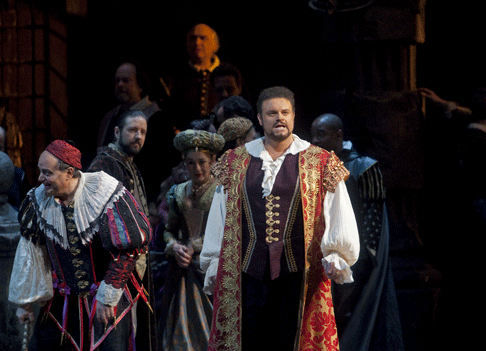10 Apr 2009
Rigoletto at the MET with Diana Damrau as Gilda
Rigoletto is the ideal first opera: a taut tale, comprehensible characters, terrific tunes, and not an ounce of fat anywhere.

Rigoletto is the ideal first opera: a taut tale, comprehensible characters, terrific tunes, and not an ounce of fat anywhere.
I was delighted to see the Met filled, at so appealing a performance as that of April 9, with young opera-goers, many of them signifying (by questions about where to find standing room and how to get to the bathrooms) that they were new to opera, or new to the Met. There was, also — as I’d rather expected — a murmur of surprised recognition when the orchestra launched “La donna è mobile” (is there a better-known melody from opera? Wagner’s “Here Comes the Bride,” perhaps), and a general appreciation of the story, the excellent acting, the melodious score, the “classic” Otto Schenk staging, as the German tourists behind me described it — no prima donnas waving cell phones, no motorcycle helmets, no leather bustiers, and a street in Italy that looked like nothing so much as a street in Italy.
They encountered an excellent, well-balanced performance: A heroine to love, a villain to hate while admiring his panache, a protagonist who seemed entirely caught up in the proceedings and a thrilling performance of the score led by Riccardo Frizza, whose attention to detail and dramatic effect were just what Verdi could have desired. This was a very spruce performance, and made one eager to hear what Frizza could do with other familiar items in the Italian repertory.
Joseph Calleja is one of the new crop of exciting young tenors in the Italian repertory. A sturdy, masculine figure — taller than almost anyone else at the court of Mantua — he acted and sang the seductive Duke with careless elegance and athletic ease, with a fluid, forthright tenor and sudden diminuendos at moments for dramatic effect. It was a completely reliable performance if not yet quite so polished as (for example) Ramón Vargas ten years ago, but in that line and heading in that graceful direction.
Diana Damrau has a cool, refreshing voice, clear and house-filling, and she is an ardent actress. One could hope for a more precise trill, and — perhaps on the conductor’s insistence — she omitted optional high notes everywhere and the long trail-off with which Gildas used to leave the stage after “Caro nome,” but in this age of more realistic acting and “come scritto” singing, she is a first-rate Gilda. Too, she is a tiny woman and makes the right vulnerable impression beside a tall Duke and a tall Sparafucile. She can also seem to whisper (at such moments as her shamed entrance in Act II) when she is doing nothing of the sort, and then surprise us with the power of her protest at her father’s plans for vengeance. I’m sure the first-timers will remember her fondly at more ordinary Rigolettos.
 Joseph Calleja as the Duke [Photo by Ken Howard courtesy of The Metropolitan Opera]
Joseph Calleja as the Duke [Photo by Ken Howard courtesy of The Metropolitan Opera]
Roberto Frontali may lack the power to knock us out with “Cortigiani,” but he sings and plays a, convincing portrait of Verdi’s humanized monstrosity, a man eaten up by hatred of the world and of his own place in it, whose one soft spot is invaded and infected by the very viciousness he has himself encouraged in the corruptions of the court. His snarling contempt in the final scene for what he thinks is the corpse of his former master riveted the house, his horror brought shock (and a marked cessation of coughing). It made a solid, convincing centerpiece to an opera too easy to lose to the charms of an ideal Duke or Gilda.
Raymond Aceto’s Sparafucile rumbled on the low notes; he aroused great enthusiasm — who doesn’t love an unembarrassed professional villain? The smaller roles were well and enthusiastically handled all around, especially David Crawford’s nervous Ceprano, Kathryn Day’s firm-voiced Giovanna, and Viktoria Vizin’s Maddalena, determined that her legs should share the honors with her voice.
John Yohalem